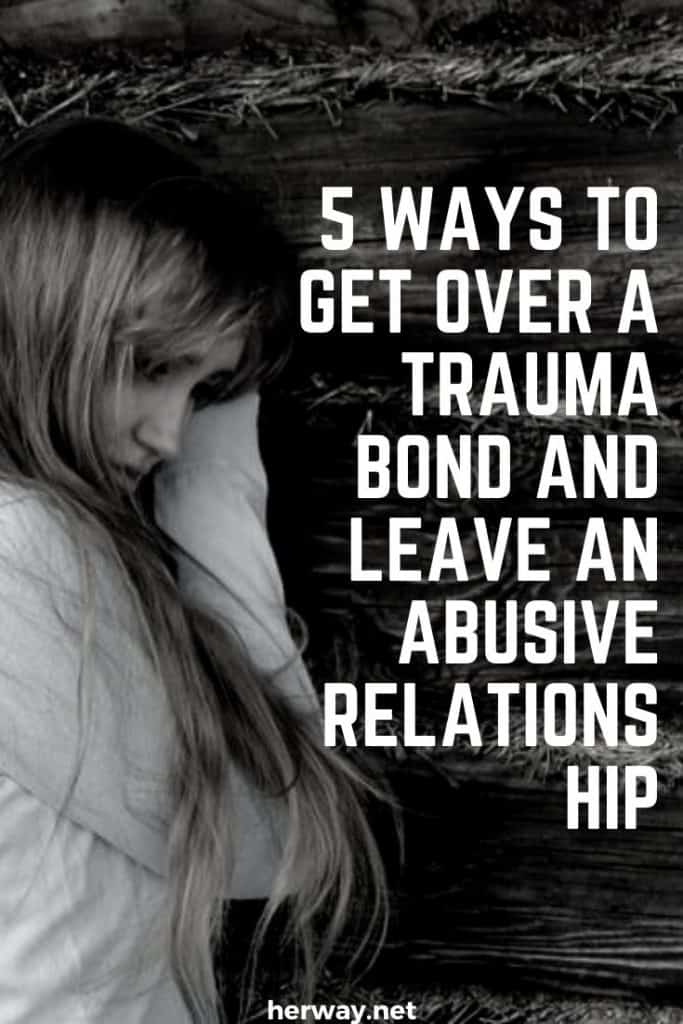5 Ways To Get Over A Trauma Bond And Leave An Abusive Relationship
A trauma bond is a type of dynamic which is characteristic of abusive relationships .
It happens when a victim becomes so emotionally tied to their abuser to the point where they can’t seem to find a way to detach from them, even though deep down they know how toxic their partner really is.
Even though this is the last thing one might expect, when trauma bonding occurs, the victim feels intense love, loyalty and devotion to their abuser and leaving this relationship and getting over this bond seems like mission impossible.
However, it can be done and here are 5 bulletproof ways to do so.
Identify the problem

The first thing you have to do if you really want to get rid of your abuser and help yourself heal is to look the truth directly in the eye and accept that your relationship is anything but healthy.
First and foremost, you have to understand that your perception of what love should look like is not right and that your partner is actually your abuser.
Besides, you just think you love them when you are actually addicted to and emotionally dependent on them.
Realizing that you’ve been sharing your life with a toxic person and that this, what the two of you have, is a trauma bond instead of love is quite difficult but once you do so, everything will be easier from that step onwards.
If you have trouble perceiving your relationship without realizing this, try looking at it as an outsider because that will give you a more objective perspective of things.
How would you feel if one of your friends or family members were treated the way you are treated? What would you tell them to do?
Start living in reality

In addition to identifying the problem, you also have to stop living in the past or in the potential future if you really wish to get over this trauma bond you’ve got yourself stuck in.
Do your best to focus on the present moment and to put all of your energy into saving yourself from your current relationship.
This means stop reminding yourself how your partner treated you with love and care at the beginning of the relationship and wishing for those times to come back.
Stop trying to figure out where everything went wrong or blaming yourself for not doing some things differently when you had the chance to.
Apart from this, you also have to stop fantasizing about the bright future you had all planned out in this head next to this man.
To stop dreaming about how things could or should be, if he just acted a little bit differently.
To stop hoping and waiting for your love to change your abuser because that will never happen.
Acknowledge your emotions

Repressing your emotions and running away from them, no matter how painful they are, won’t get you anywhere.
They won’t magically disappear just because you act like they are not there.
In fact, the only thing you will accomplish by trying to hide your true feelings is for them to pile up and be harder to handle in the future.
Besides, you’ll have to face each one of your emotions sooner or later, so why not start now?
Another important thing is not to allow your toxic partner to manipulate you into thinking that you are overreacting or exaggerating for feeling certain things.
No, you are not crazy—he just wants to make you think that so you become easier to control.
Commit to self-change

Changing our patterns of behavior and habits is difficult for everyone and especially for the people who find themselves trapped in a never-ending circle of emotional violence.
Nevertheless, it is something you have to do and it is a necessary step in the process of self-healing.
Make a list of your self-destructive behaviors and promise yourself that you will change each one of them as soon as possible.
For example, you may always find yourself replying to your abuser’s texts or answering his phone calls when he wants to apologize.
Or you have a habit of going to the places you might see him every time he ghosts you.
These are some things you might not even be aware of doing but some self-introspection will help you identify these patterns of behaviors. Subsequently, once you manage to do this, your power of free will will help you change these patterns and will eventually help you move on from this relationship for good.
Get help

The last but definitely not the least important thing you ought to do in order to get over a trauma bond and leave an abusive relationship is to seek help.
Remember—none of these things you’ve experienced is your fault and you have nothing to be ashamed of.
Even though talking to a professional is always a good idea, you can also try sharing your problems with your closest friends and family members.
Besides having the opportunity to hear other people’s opinions, which can serve you as a reality check, reaching out to your loved ones will also help you know that you are not alone in all of this.








